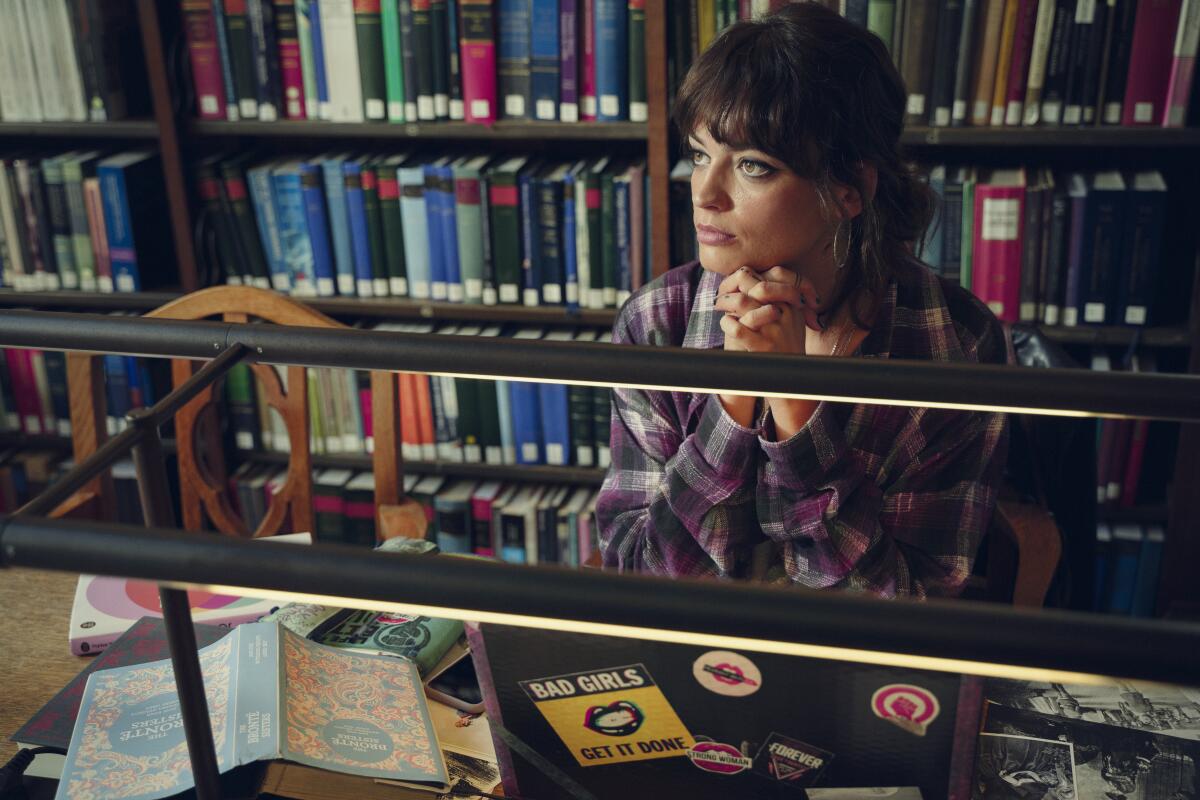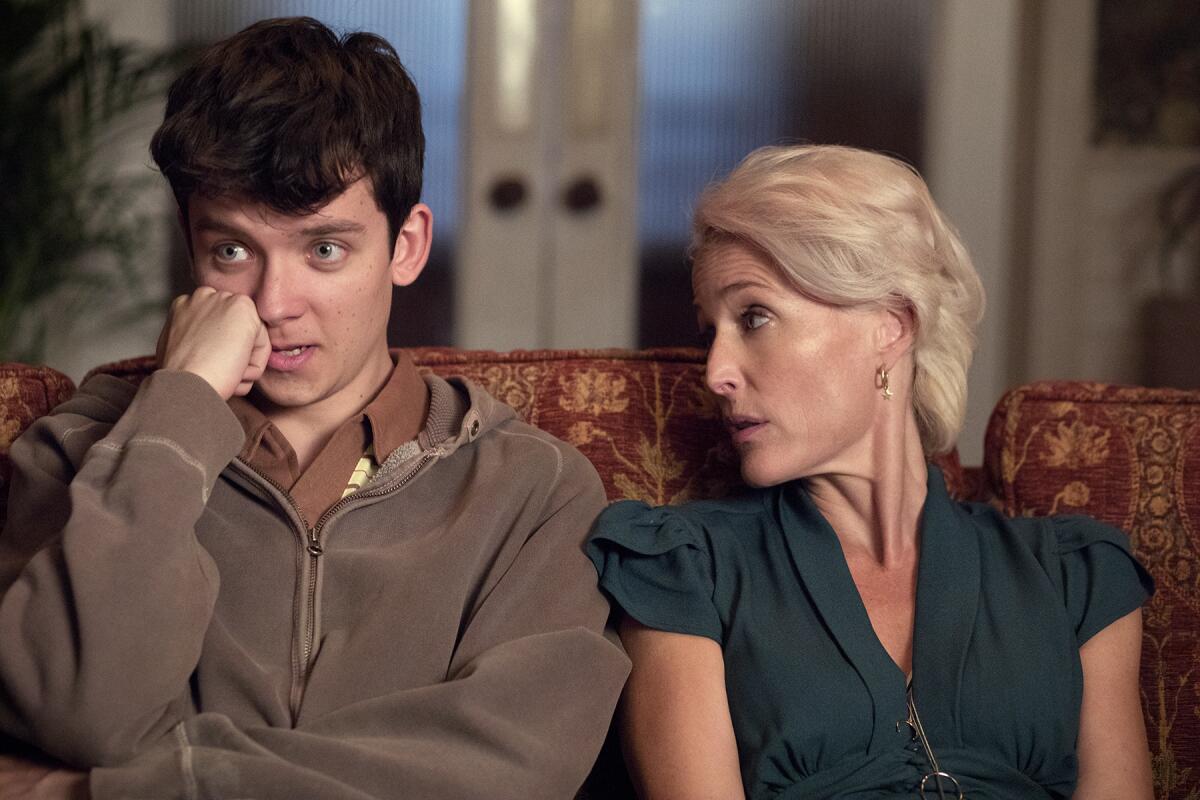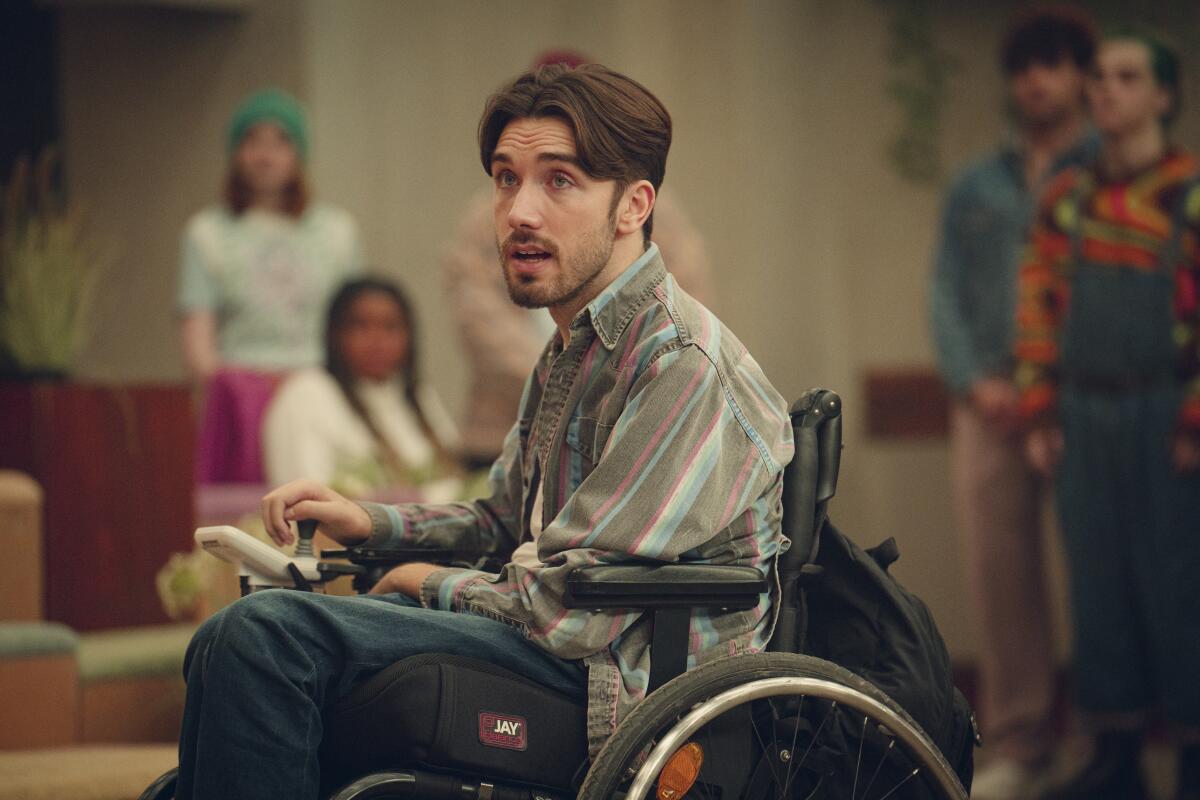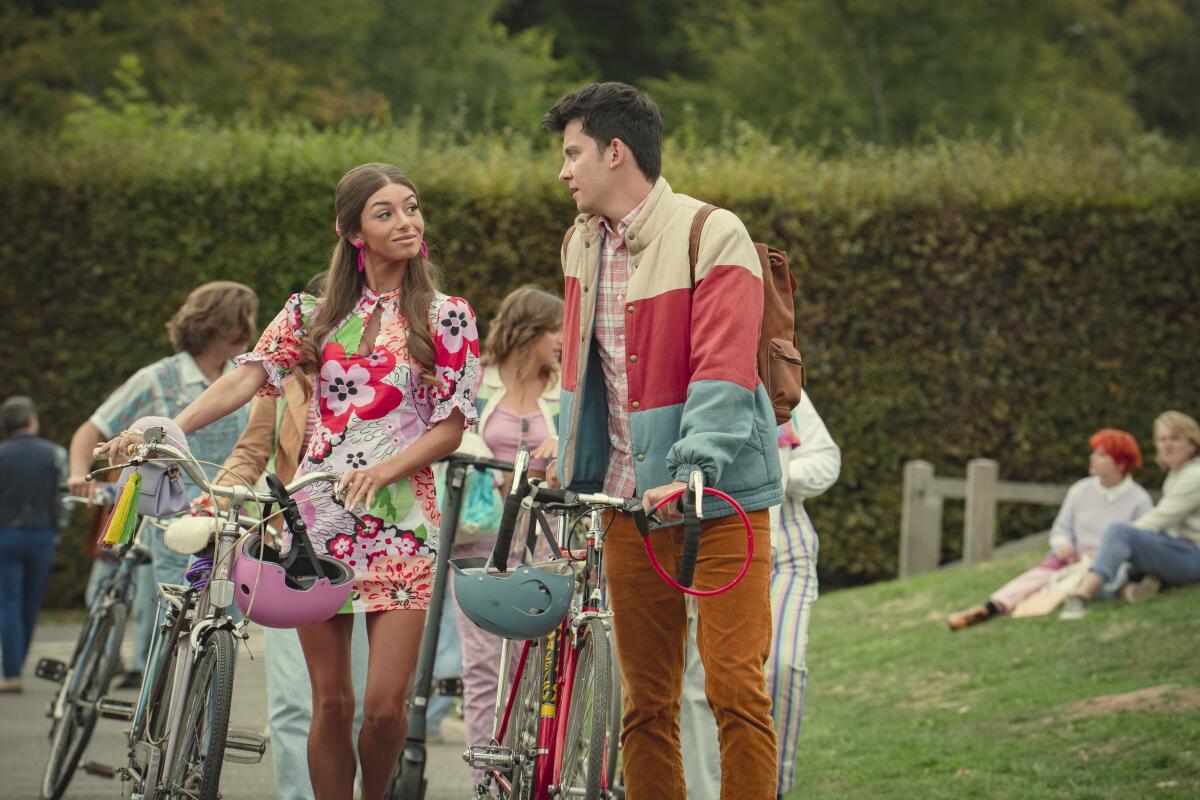‘Sex Education’ was groundbreaking in its portrayal of teen intimacy. But was it realistic?

- Share via
This article contains spoilers for Season 4 of Netflix’s “Sex Education.”
The fourth season of “Sex Education” opens with sex. So much of it: A teenage couple undresses in the college library. Two young men make out passionately against a tree in broad daylight. Orgasmic screams echo through a dorm room wall. There’s even a dog dry-humping a football — for those in the audience who haven’t yet figured out that in this show, really everyone does get off.
“Sex Education” is about teenagers in search of sex, a genre that has traditionally explored the cluelessness, embarrassment and shame surrounding first love and intimacy. But in the paradisaical world of “Sex Education”, which debuted to great success in 2019 and is coming to an end Thursday with its final season airing on Netflix, shame is almost nonexistent. And if there is, you can always talk about it.
One character, Eric (Ncuti Gatwa), claims he sends nudes “all the time.” Another student, Aimee (Aimee Lou Wood), tests and reviews vibrators as part of her healing from sexual assault. Previous seasons saw the principal’s son strip naked in front of the entire school and a gay student teach anal douching during recess.
And then there is Otis (Asa Butterfield), the show’s main character: A shy and awkward 16-year-old who, in the first episode of Season 1, said he just wanted to “sit in a corner all day,” but then miraculously became an on-campus sex therapist treating his peers and their various sexual troubles. He’s not exactly experienced himself, but he knows all about sex thanks to his mother Jean (Gillian Anderson), a sex and relationship therapist who loves to discuss her patients woes at the breakfast table.

“Sex Education” has been widely celebrated for its open and honest dialogue about sex, as well as for its very diverse portrayal of teen intimacy. Anyone can have sex without shame, the show seemed to want to say, whether you’re gay, straight, trans or in a wheelchair. The first step is to talk about it.
As a viewer whose pop-cultural sex education consisted of movies like “American Pie” or “Superbad” (both of which feature a bunch of awkward 18-year-olds hoping for nothing more than to get laid just once before the end of senior year), this is what made “Sex Education” so fascinating to watch. But one also couldn’t help but wonder: Are today’s teenagers really so open about sex? And do they really have so much of it? Research suggests that with the “no rush for sex” trend, with social isolation and teen depression on the rise in the U.S. and Europe, members of Gen Z are actually having less sex than previous generations.
The British intimacy coordinator David Thackeray, who joined the show in Season 2, says the many scenes of teenagers having seemingly confident, uninhibited intercourse are “pretty heightened” — meant to serve “as a tool to open up discussion about different elements of intimacy.”
An oral history of what’s been affectionately dubbed ‘the bus scene,’ which made creator Laurie Nunn and many Netflix viewers feel ‘less alone.’
“There are different scenarios that these characters are in that maybe some people are going through, or have been through, or recognize,” Thackeray said over a Zoom interview. “And they can go, ‘Oh, that’s a way of dealing with that!’ It is literally a lesson. Or at least bringing up a conversation about it.” He says he remembers watching Season 1 of the show, thinking, “I wish I had this when I was a teenager.”
“Sex Education” was the first Netflix show to hire an intimacy coordinator, a relatively new profession that helps make intimate scenes both safe for the actors and believable for the audience. Groundbreaking moments included a sex scene between a quadriplegic boy named Isaac (George Robinson) and his trailer park neighbor Maeve (Emma Mackey) in Season 3, as well as a storyline about two nonbinary teens and their attempts at chest binding.

According to Thackeray, the show’s writers went to great lengths to ensure the authenticity of such scenes. “They had people who did all this research — they even brought in specialists who are specific for different intimate moments, just to make sure it’s correct in the script,” he said. “And later on in the series they also spoke to the cast, asking them: What do you think your character would do in this moment?”
These are certainly not easy times to make a show about teen intimacy. While a heightened sensitivity to diverse sexual orientations and gender-fluid identities is commonplace in liberal circles, calls to ban books that even hint at sexuality are on the rise in more conservative parts of America.
The creators of “Sex Education” have chosen to navigate this thorny discourse by making the show more idealistic than ever. In the first season, a teenager says, “I wish I could be a normal kid.” In the fourth season, a client at Otis’ sex clinic declares, “I like to lick armpits. Is that normal?”
The show’s setting has also become more avant-garde. While the first three seasons were set at Moordale Secondary School, an ethnically diverse institution but otherwise as much of a shark tank as any teenage comedy’s high school, Season 4 takes place at Cavendish College, a student-run, gossip-free, pastel-colored Bauhaus dream. “There’s daily meditation, silent discos, sounds baths and yoga on offer,” one student explains to the newcomers from recently shut-down Moordale, “because we believe your mental health matters.” Everybody wears bike helmets, and the popular kids include a transgender couple and a girl with a hearing disability. When the elevator breaks down yet again and Isaac can’t get to an exam on the upper floor, the whole school stages a sit-down strike in his support. “Everyone in this college is so sweet and good-natured,” hisses Ruby (Mimi Keene), former queen bee of Moordale. “It’s disgusting, really.” Yet this remains the only hint of cynicism the show allows, and Ruby will later come to realize that this school is “trying to make the world a better place. And that makes me want to be better.”

“Sex Education” does a very good job of educating viewers about the many versions of how to be intimate (the caption on the billboards reads “Finish together”). There is gay sex, transgender sex, sex fetishizing aliens, sex with a Scottish accent. There is also emotionally abusive first love and a young man experiencing a cancer scare. In that sense, the show is a sex-ed class in itself (Thackeray says one message of the show was “making sure you check your genitals for lumps and talk about it”).
But for the most part, the creators seem to have been most concerned with checking every possible box in the final season — which is noble, but also makes “Sex Education” much more activist than realistic. Conversely, the show misses some of the issues that are still very real in the world viewers live in. Regardless of politics or beliefs, being a teenager is still confusing and sex is still very vulnerable. It would have been refreshing to see a storyline about a teenager who is not ready to have sex. And why is there no conversation about what it’s like to be in a relationship with someone who is quadriplegic? It’s wonderful to see Isaac with Maeve (and, in Season 4, with Aimee), but it would be more constructive to learn about the conflict she might experience about his physical abilities instead of pretending it doesn’t exist.
And so, some of the most relatable moments in this season are the ones that have nothing to do with sex at all: When former headmaster Michael Groff (Alistair Petrie) tells his son Adam (Connor Swindells): “I love you. You’re my son. I just don’t like myself.” When Otis’ mother Jean opens up about her postpartum depression. Or when Eric tells Otis that he does not always feel seen and understood in their friendship.
And then there is “the Ross and Rachel from ‘Friends’ moment for ‘Sex Education,’ ” as Thackeray puts it. Two teenagers are sitting on a bed, both wearing striped, oversized T-shirts. They say, “I love you,” then they go on to have sex under the sheets. Jeff Buckley’s “Last Goodbye” plays in the background: “Kiss me, please kiss me.”
It may not be the most progressive scene of “Sex Education.” You might call it boring, even. But sometimes, that’s just what you need to see to feel seen.
More to Read
The complete guide to home viewing
Get Screen Gab for everything about the TV shows and streaming movies everyone’s talking about.
You may occasionally receive promotional content from the Los Angeles Times.






